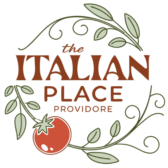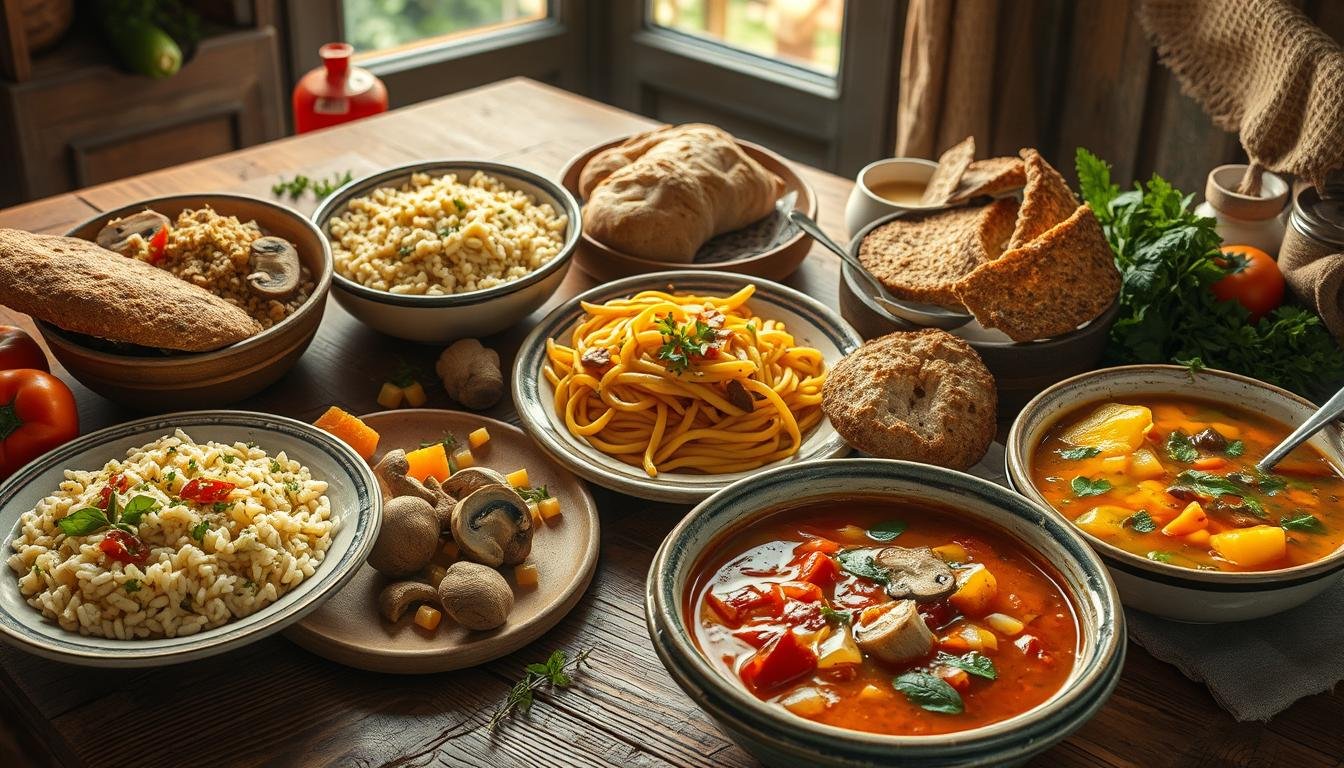Central Italian cuisine is famous for its deep flavours and traditional dishes. This article dives into 10 iconic dishes from Italy’s heart. It shows the region’s rich culinary heritage. From rich pasta dishes to hearty meat preparations, these recipes highlight the unique tastes of Regional Italian Cuisine. They are shaped by local ingredients and ancient cooking methods.
Key Takeaways
- Central Italy is renowned for its traditional and iconic regional dishes.
- The recipes explored in this article highlight the unique flavours and ingredients of Central Italian cooking.
- Pasta, meat, and vegetable-based dishes are all showcased, reflecting the diversity of the region’s culinary heritage.
- These Classic Central Italian Dishes are influenced by local produce and time-honoured cooking methods.
- Embracing Traditional Tuscan Fare allows you to experience the authentic taste of Central Italy.
Introduction to Central Italian Cuisine
Central Italian cuisine is known for its simplicity. It focuses on the quality of local ingredients. From Umbria’s olive groves to Lazio’s vineyards, the region’s food traditions are rooted in its rich land.
The cooking methods often include slow-cooking and wood-fired ovens. This results in flavors that truly capture the essence of the land.
Unique Characteristics of Central Italian Dishes
The dishes of Central Italy celebrate high-quality, seasonal produce. Olive oil, fresh herbs, and local ingredients are key. These ingredients form the base of these culinary wonders.
The slow-cooking techniques bring out the natural sweetness and depth of flavors. This creates a perfect harmony on the palate.
The Influence of Local Ingredients
The terroir of Central Italy deeply influences its cuisine. Umbrian recipes highlight the region’s olive oil. Lazio’s dishes are shaped by its sheep’s milk cheeses, like Pecorino Romano.
Marche’s food heritage is marked by its proximity to the Adriatic Sea. It focuses on fresh seafood and delicate coastal flavors.
| Region | Signature Ingredients | Culinary Influences |
|---|---|---|
| Umbria | Olive oil, truffles, legumes | Rustic, earthy flavors |
| Lazio | Pecorino Romano, guanciale, tomatoes | Hearty, meat-based dishes |
| Marche | Seafood, olives, fresh herbs | Coastal, Mediterranean influences |
Central Italian cuisine celebrates the region’s agricultural riches. It’s a true celebration of the land’s bounty. By exploring Umbrian Recipes, Lazio Culinary Traditions, and Marche Food Heritage, you can experience the essence of Italy.
Pasta Dishes That Define Central Italy
Central Italy, including Tuscany and Umbria, is famous for its pasta. You’ll find thick pici from Siena and delicate tagliatelle from Bologna. Fresh pasta is key to many iconic dishes here.
The Importance of Fresh Pasta
In Central Italy, pasta is more than food; it’s an art. The region uses top-notch ingredients and old techniques. This makes their pasta unique, with a texture and taste that mass-produced pasta can’t match.
Traditional Sauces to Try
The pasta is paired with rich, tasty sauces that make Central Italian cuisine special. Cacio e pepe from Rome is a classic, with Pecorino Romano cheese and black pepper. The ragù alla bolognese from Bologna is also famous, with its slow-cooked meat sauce that goes well with fresh tagliatelle.
| Iconic Central Italian Pasta Dishes | Regional Origins |
|---|---|
| Pici | Siena, Tuscany |
| Tagliatelle | Bologna, Emilia-Romagna |
| Cacio e Pepe | Rome, Lazio |
| Ragù alla Bolognese | Bologna, Emilia-Romagna |
Enjoying cacio e pepe or ragù alla bolognese is a true taste of Central Italy’s heritage. These dishes showcase the region’s culinary traditions.
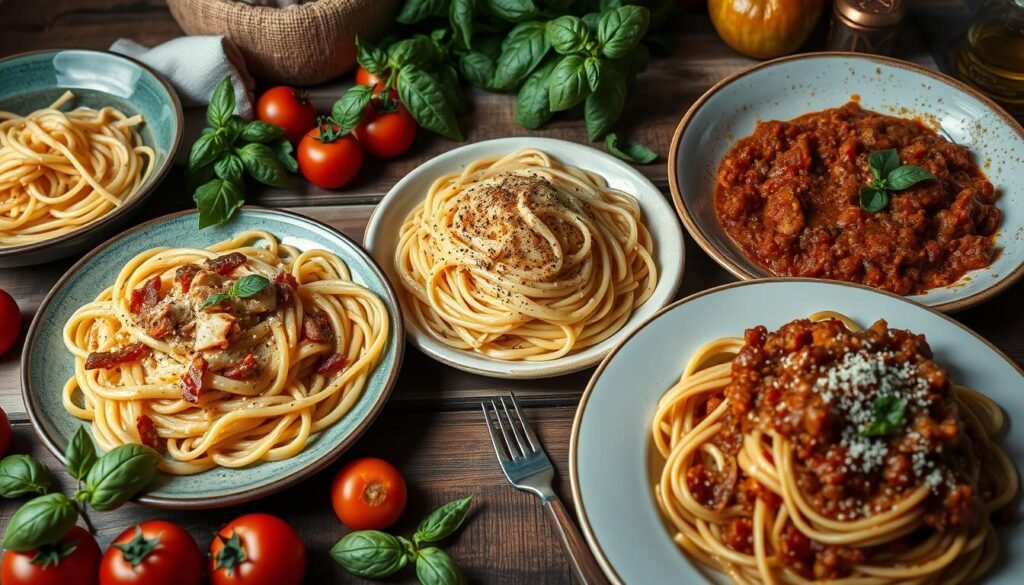
Discovering Risotto Recipes
Risotto is not just a Northern Italian dish. It’s also a staple in Central Italy. The Risotto alla Milanese is a classic from this area, made with saffron. Chefs in Central Italy also use local ingredients to create new risotto recipes.
Classic Risotto alla Milanese
The Risotto alla Milanese shows off Central Italy’s fine taste. It uses Arborio or Carnaroli rice, simmered in a rich broth with saffron. The recipe calls for a small onion and 70-100g of rice per person.
The liquid is added in a 1:1 to 1:2 ratio to the rice. It takes about 20 minutes to cook until it’s al dente.
Seasonal Variations to Experiment With
- Risotto with Porcini Mushrooms: This version is rich and earthy, using mushrooms from Umbria and Marche.
- Truffle Risotto: Fresh truffles from Umbria or Marche make this dish luxurious.
- Seafood Risotto: The coastal areas of Le Marche provide fresh seafood for this risotto.
- Vegetable Risotto: This dish highlights Central Italy’s fresh produce, like artichokes and tomatoes.
Making a great risotto is all about the process. Start with a flavorful base, toast the rice, and add the liquid bit by bit. Stir constantly until it’s just right. With practice, you’ll master the art of risotto, exploring the rich flavors of Central Italy.
Rustic Bread Varieties
Bread is a big deal in Traditional Tuscan Fare and Regional Italian Cuisine. In Tuscany, you have the salt-free Pane Toscano. In Lazio, there’s the crispy Pane Casareccio. These breads are key to Central Italy’s food traditions.
Pane Toscano: The Bread of Tuscany
Pane Toscano is a special bread from Tuscany, known for not having salt. This lets the flour’s natural sweetness come through. It’s great with local olive oils, cheeses, and meats. Its crusty outside and soft inside make it a favourite in Regional Italian Cuisine.
How to Make Your Own Artisanal Bread
Making your own artisanal bread is rewarding. You can try a classic Pane Toscano or other rustic breads. It’s easy and fun. Making bread brings Traditional Tuscan Fare into your kitchen.
- Start with 6 oz of regular flour, 1 cup of water, and a bit of brewer’s yeast in a bowl. Let it rise for 6 hours, then seal it.
- Add 1 cup of regular flour and 1 cup of water to the dough. Knead it and let it rise for another 6 hours.
- Heat your oven to 420°F (220°C). Bake for 10 minutes, then lower the heat to 350°F (180°C) and bake for 40 more minutes.
With a bit of practice, you can make your own Traditional Tuscan Fare at home.
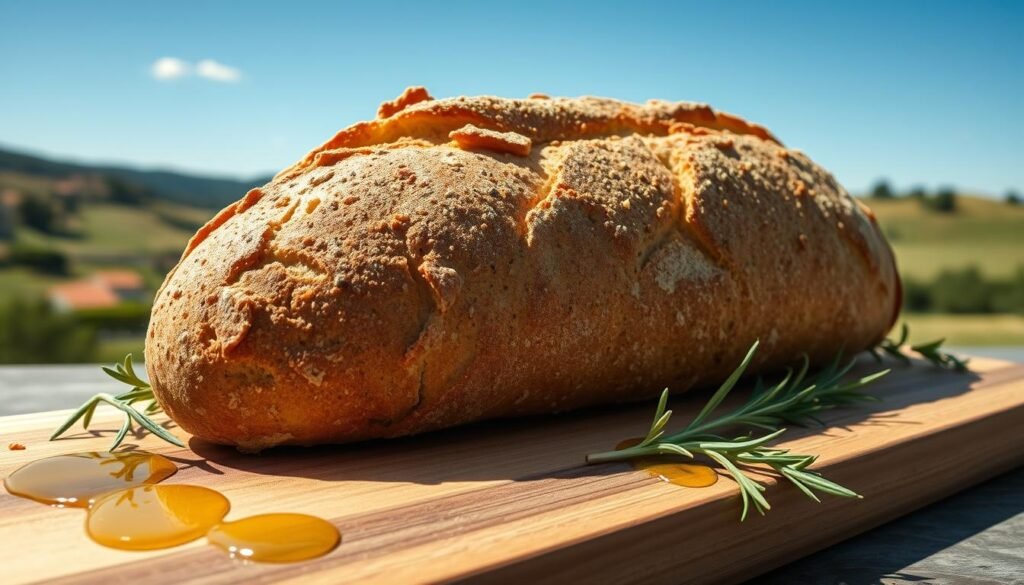
“Pane Toscano is the very essence of Tuscan cuisine, with its unique, salt-free flavour that allows the true character of the flour to shine.”
Hearty Meat Dishes to Savor
Explore the rich world of Central Italian cuisine, where meat dishes are the stars. Enjoy the slow-cooked Abbacchio alla Romana and the tasty Porchetta. These Roman Specialties and Rustic Central Italian Meals highlight the area’s long-standing cooking traditions.
Slow-Cooked Abbacchio alla Romana
Abbacchio alla Romana is a favorite in Rome. It’s a tender lamb dish cooked slowly with herbs like rosemary and garlic. This mix of flavors will take you straight to Italy’s heart.
The Rich Flavours of Porchetta
Porchetta comes from central Italy and is loved worldwide. It’s a fatty roasted pork dish with a juicy, herb-filled pork belly. Slow-roasted to perfection, it’s served in thick slices for a truly satisfying taste.
| Dish | Origin | Key Ingredients |
|---|---|---|
| Abbacchio alla Romana | Rome | Lamb, rosemary, garlic |
| Porchetta | Central Italy | Pork belly, herbs |
“The alluring aromas of slow-cooked lamb and fragrant roasted pork waft through the streets of Central Italy, beckoning the senses and inviting you to indulge in the region’s rustic culinary delights.”
Celebrating Regional Vegetables
The green landscapes of Central Italy are full of amazing produce. Each region has its own special way of cooking. In Lazio, making carciofi alla romana (Roman-style artichokes) is a big deal. These artichokes, cooked in garlic, parsley, and olive oil, show off the region’s love for food.
Central Italy has more than just carciofi alla romana. You can find zucchini flowers, fava beans, and wild chicory in traditional dishes. Using fresh vegetables brings out the best taste and health benefits. This shows the respect for Lazio culinary traditions and regional Italian cuisine.
The Art of Preparing Carciofi alla Romana
Making carciofi alla romana is a special process. It needs skill and a love for the dish’s flavours. The artichokes are cleaned and cooked in a broth with garlic, parsley, and olive oil.
This dish highlights the artichokes’ natural sweetness and earthiness. The garlic and parsley add a nice aroma. Carciofi alla romana is a symbol of Lazio’s simple yet high-quality cooking.
Understanding Seasonal Produce in Central Italy
- Zucchini Flowers: These delicate blossoms are a prized ingredient in regional Italian cuisine, often stuffed with ricotta and fried to golden perfection.
- Fava Beans: The humble fava bean takes centre stage in many Central Italian dishes, from hearty pure di fave (fava bean purée) to pasta con le fave (pasta with fava beans).
- Wild Chicory: The bittersweet notes of wild chicory lend themselves beautifully to salads, sautés, and even as a filling for savoury tarts.
Central Italian cooking celebrates the seasons. It follows the land’s rhythms and the calendar. This way, cooks make dishes that are tasty and connected to the earth.

“The true essence of Central Italian cuisine lies in its reverence for the land and its seasonal gifts. Each ingredient is treated with the utmost care, allowing its natural flavours to shine.”
Luxurious Cheese Selections
Central Italy is famous for its cheeses, each with its own special taste. Pecorino Toscano, a sheep’s milk cheese from Tuscany, is a standout. It has a firm texture and a nutty, tangy flavour that goes well with many dishes.
There’s more to Central Italy’s cheese selection than just Pecorino Toscano. You’ll find creamy Mozzarella di Bufala from Campania and strong Pecorino Romano from Lazio. These cheeses add a special touch to the region’s famous food. They’re great on their own or in a variety of dishes, from pasta to salads and grilled meats.
Pairing Cheeses with Classic Italian Dishes
Learning to pair cheeses with traditional Italian dishes is a joy. A sprinkle of Pecorino Toscano can make a simple spaghetti alla carbonara taste better. Mozzarella di Bufala pairs well with the tangy taste of a Caprese salad. For a treat, try a charcuterie board with different cheeses, meats, olives, and bread. It’s a great way to enjoy Central Italian food.
| Cheese | Origin | Characteristics | Pairing Suggestions |
|---|---|---|---|
| Pecorino Toscano | Tuscany | Firm, nutty, and slightly tangy | Pasta dishes, salads, grilled meats |
| Mozzarella di Bufala | Campania | Creamy, fresh, and delicate | Caprese salads, pizza, pasta |
| Pecorino Romano | Lazio | Firm, salty, and slightly peppery | Pasta dishes, soups, salads |
Exploring Central Italy’s cheese selection opens up a world of flavours. It helps you appreciate the rich cuisine of the region even more.

Iconic Desserts of Central Italy
Central Italy is famous for its delicious desserts. These treats celebrate the region’s rich produce and cooking traditions. From tiramisu to crostata di ricotta, they make any Regional Italian Cuisine or Classic Central Italian Dishes meal special.
The Delight of Tiramisu
Tiramisu comes from the Veneto region but is loved everywhere in Central Italy. It’s a coffee-infused dessert with creamy layers. Ladyfingers soaked in espresso are layered with mascarpone cheese, cocoa powder, and sometimes liqueur.
The Flavourful Crostata di Ricotta
The crostata di ricotta is a must-try Classic Central Italian Dishes dessert. It’s a tart from Rome and Lazio filled with ricotta custard. The tart is flaky and buttery, topped with citrus zest or vanilla.
| Dessert | Key Ingredients | Origin |
|---|---|---|
| Tiramisu | Ladyfingers, espresso, mascarpone, cocoa powder | Veneto |
| Crostata di Ricotta | Ricotta, butter, eggs, sugar, citrus zest | Rome, Lazio |

These Regional Italian Cuisine desserts show Central Italy’s love for food. They are loved by diners in Australia and around the world.
Wine Pairings for Central Italian Recipes
Enjoying Traditional Tuscan Fare and Regional Italian Cuisine is even better with the right wine. Central Italy, with its famous wine areas like Tuscany and Umbria, has many great wines. These wines match perfectly with the region’s famous dishes.
Understanding the Tuscan Wine Landscape
Tuscany is known for its wide range of wines. You’ll find classics like Chianti and Brunello di Montalcino, and also Super Tuscan blends. Chianti, made since the 14th century, goes well with tomato sauces and wood-fired pizzas. This is because of its good balance of acidity.
Recommended Wines for Your Dishes
Here are some wine pairings to make your meals even better:
- Primitivo is great with meatballs in sugo because of its low tannins and medium acidity.
- Sauvignon Blanc, with its crisp freshness, pairs well with seafood, white meats, and herbs like rosemary and basil.
- Rosé wines, with their floral and fruity notes, are perfect for warm weather. They go well with creamy, tangy foods like bruschetta and fresh mozzarella.
- For pasta and meatball dishes, choose bold reds like Chianti and Nero d’Avola.
Whether you’re enjoying Tuscany’s rich flavors or exploring Central Italy’s diverse dishes, the right wine can make your meal special. It can take you straight to the heart of this amazing region.

“Wine is one of the most civilized things in the world and one of the most natural things of the world that has been brought to the greatest perfection, and it offers a greater range for enjoyment and appreciation than, possibly, any other purely sensory thing.”
― Ernest Hemingway
How to Host a Central Italian Dinner
Hosting a Central Italian dinner is more than just food. It’s about creating a real Italian feel. Paying attention to details like the table setting and cooking tools makes a big difference.
Tips for Setting the Perfect Italian Table
Bring the charm of Central Italy to your table. Use natural textures and simple decor. Choose earthy table linens and pair them with ceramic plates and glassware.
Add a few sprigs of fresh herbs or olive branches to the table. It brings a natural beauty to your setting.
Essential Cooking Equipment for Authentic Dishes
- Pasta machine: Fresh pasta is key in Central Italian cooking. A pasta machine lets you make real tagliatelle and rigatoni.
- Heavy-bottomed pot: For slow-cooked meats like Abbacchio alla Romana or Porchetta, a good pot is crucial.
- Wood cutting board: Serve meats, cheeses, and other Rustic Central Italian Meals on a wood board. It adds to the rustic feel.
With the right table and tools, you can bring Italy to your guests. It makes for a memorable Central Italian dinner.
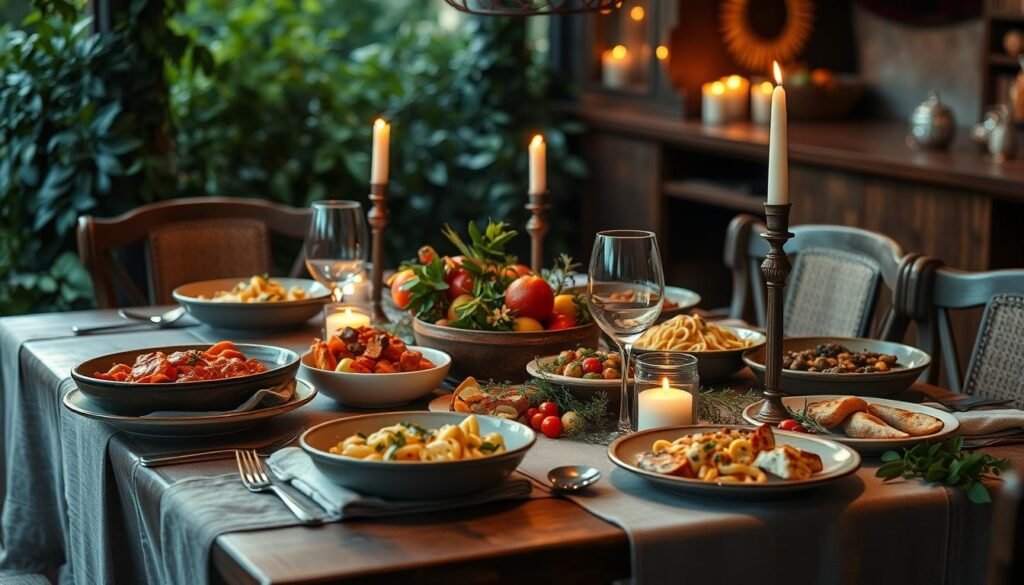
Conclusion: The Heart of Italian Cooking
At the heart of Classic Central Italian Dishes and Regional Italian Cuisine is a rich tradition. This tradition captures the essence of Italian cooking. From Tuscany’s sun-kissed hills to Rome’s lively streets, Central Italy’s flavours have won hearts worldwide.
Embracing the Flavors of Central Italy
Exploring Central Italian cuisine reveals its depth and complexity. Home cooks can learn to make handmade pasta, perfect risottos, and use local produce. These dishes show the beauty of simplicity and the power of quality ingredients.
Making these Recipes Your Own
As you explore Classic Central Italian Dishes, remember the joy of making them your own. Try seasonal ingredients, local produce, and your flair. This way, you honour tradition while showing your unique style.
Central Italy’s culinary journey is filled with rich flavours and time-honoured techniques. By embracing these recipes and making them your own, you bring a taste of this region to your table. You also connect more deeply with Italian cooking’s heart.

“Italian cooking is not about inventing new dishes, but rather perfecting the old ones.”
| Regional Variations in Italian Cooking | Italian Cooking Methods of Otao Kitchen |
|---|---|
|
|
Additional Resources for Italian Cooking
Exploring Central Italian cuisine is exciting. There are many resources to help you. You can find cookbooks, online communities, and cooking classes. These will help you learn more about authentic Italian dishes.
Recommended Cookbooks for Further Inspiration
“The Silver Spoon” and “Essentials of Classic Italian Cooking” by Marcella Hazan are must-haves. They offer a deep dive into Regional Italian Cuisine. You’ll learn traditional recipes and cooking techniques.
Online Communities and Cooking Classes
Online, you can join communities and take virtual cooking classes. These places are great for learning from chefs and sharing tips. They’re perfect for anyone wanting to explore Central Italian flavors.
